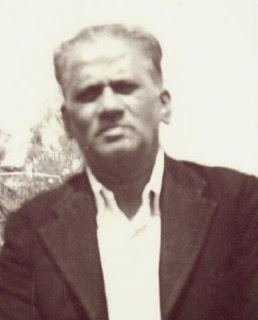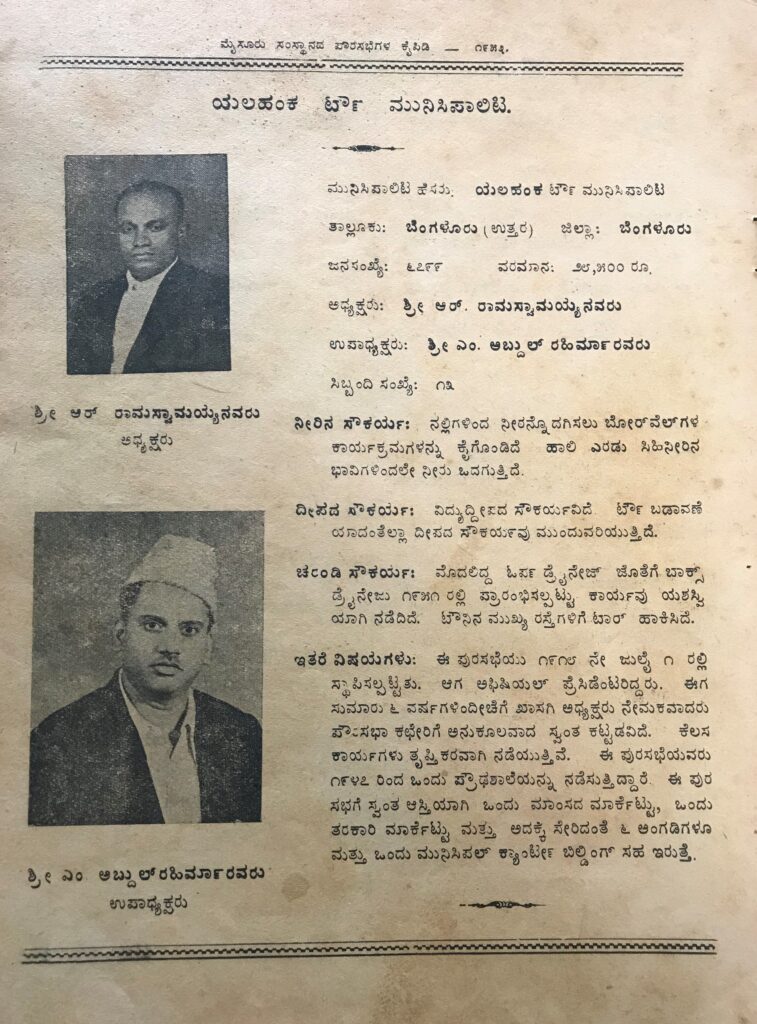
On this father’s day, I will be dedicating half an hour to reflect on my father, Mohamed Abdul Rahman. He is one of my mentors and an affectionate and caring father who opened many windows of knowledge for me. I was four years old, and he taught me Kannada, English, Hindi, and Urdu at home and drew animals, cars, bicycles, and other things. The irony is he did not go to High School – when I was out of town, he wrote letters to me in English. He had beautiful handwriting, and I have inherited that.
If I am a pluralist today, if I respect the otherness of others and have no prejudice towards others, it was his teaching; living by example.
When the Dalits (Lower caste among Hindus) were not allowed in homes in the area, it was a shameful act in practice then, but my father invited them into our home, and my mother shared the food with them on the same plates and the same glasses of water. That was one of the biggest lessons of life to treat everyone with dignity and respect. That teaching landed me in an all-Black neighborhood, and I have been pleased to live here for the last five years. https://theghousediary.com/black-neighborhood-is-my-residence/
If you are one of the parents who teach your children to look down on people other than your own kind, you are essentially running a sewer in their body system and messing them up for a lifetime. It would be difficult for them to live with people who are different than them. You must turn in yourselves into some educational courses to set yourselves free from prejudices. If it is you, please go to interfaith meetings and intercultural events, it will gradually fix you up by removing the sewer line and replacing it with oxygen?
In the 1950s and 60’s India was pretty much like the United States, both nations treated their Blacks and Dalits shamelessly. The Dalits, also known as untouchables were not allowed to step into our homes – my father broke all the wrongful norms of the society, not only did they come into our home, but they also ate from the same plates as we did, and drank the tea from the same cups.
It was a big no-no at that time, and many of his friends said unsavory words, but my father stood his ground. I see that streak in me playing it out all the time. Thank you, Dad, for inculcating the value of treating every human with full dignity, and that is just one of the thousands of things you blessed me with. I love to see all of God’s creation treated fairly and justly.
Indeed, my father endured criticism and some abuse from his conservative friends; Hindus, Muslims, and others at that time. My parents told us (me and my siblings) that we are all one family, from Adam and Eve and that we will have differences and have to learn to live with each other. they often quoted the verse from Quran, to respect the otherness of others – My prayers also go to my father figure Mr. Everett Blauvelt, who opened the doors for me to enter the United States. He was indeed a very caring man and named me Mike. He was a good listener.
I miss them both today. I also appreciate my friends who are father figures to me – Davendra Maini, Bill Matthews, and Harbans Lal.
My heart goes out to those who did not have a good relationship with their fathers but, despite that, they have survived, and they can give that affection to their offspring and others. Father’s Day is a difficult day for them, while others are cherishing their fathers, they are struggling with mixed feelings to the feelings of hate. It’s not easy, and there is no quick fix to it, other than reflecting on it and taking the responsibility for your own life. Life is given to each one of us as a trust, and at least we can live up to it. Life is all about expressions and completing transactions. Every emotional thought action or change creates a new debt or a favor that needs to be re-balanced. Obviously, we cannot reciprocate the favors in full, but we have been able to do that with a thank you in the most simplistic way and that is good enough.
One of the incomplete transactions of my life was not being able to do the things I wanted to do for my father. As a kid, I would step in and take over the work from him so he can take a rest, an Indian tradition that I cherish. When I moved to Saudi Arabia on an assignment, I sent my first check to him with which he started paying off my loan. With the next check, I asked him to buy clothes for the family and wanted him to replace the old black Jacket he wore forever with a new one. He said no, first things first. In the first week of December 1977 my check paid off all my loans, and with the next check I asked him to oblige me, and he said he will. Man, I am feeling a deluge of emotions as I am writing this for the 2nd time, darn it. my eyes are welled up again.
He did not get the check; he passed away a day before receiving it. He lived up to his own words, “Until my last breath, I will be earning my living and taking care of my family.” Darn it, he did it. I was angry for my helplessness and was happy that the man kept his word. But that created a huge vacuum in my life and I continue to recover my balance by serving my senior friends in whatever little way I can. You can always count on me to drop everything off to attend to a senior’s request.
My father is my hero and opened the doors of wisdom to us. Pluralism indeed runs in my family. He taught one of the biggest lessons of my life in social cohesiveness and dealing with extremism that I continue to reflect on in my talks, acts, and write-ups.
During the communal riots in Jabalpur (India) in the early sixties, both Muslims and Hindus were killed in the
mayhem. I wish every father in India, America, and elsewhere to teach this lesson to his kids. He was crystal clear on his take; He told us the “individuals” are responsible for the bloodshed and not the religions; he would emphasize that you cannot blame the intangible religion and expect justice, we must blame the individuals who caused it and punish them accordingly for disturbing the peace and thus bring a resolution to the conflict by serving justice. He said you cannot annihilate, kill, hang or beat the religion, then why bark at it?
 My father was a Mayor of the Town of Yelahanka (The town that gave birth to Bangalore in 1537) and served the council for many years. He was also the president of the Muslim Association of the town. We grew up with no barriers between us and another human beings. He treated all of us kids with dignity and I am pleased I got to be disciplined at least once in my life. I guess I replicated that with my children to the point my kids would actually say, Dad, you should have disciplined us. I did not see the need for it. I am fine and they are fine too. I gave them the cold shoulder that my father had given me to straighten me out, and it worked both ways, although my daughter was a tough cookie, she would not budge. I was about ten years old and watched a man fall off his bicycle with his big bag of rice and was struggling to get back on it, and I wasn’t going to help him, instead, I was laughing at him. I saw my father about 100 feet away and the way he sped towards me, which got me frightened for the first time, I dashed inside the home and a few minutes later after helping the guy, he came in dashing… I climbed on top of the paddy bags in a corner of the house, I thought he could not get me there, so he goes outside and plucks a long branch off the mulberry tree and gives me a few good ones. “My son will never do that” after that conditioning, I have developed the habit of stopping for everyone who needs help. I dare not watch and not do something about it.
My father was a Mayor of the Town of Yelahanka (The town that gave birth to Bangalore in 1537) and served the council for many years. He was also the president of the Muslim Association of the town. We grew up with no barriers between us and another human beings. He treated all of us kids with dignity and I am pleased I got to be disciplined at least once in my life. I guess I replicated that with my children to the point my kids would actually say, Dad, you should have disciplined us. I did not see the need for it. I am fine and they are fine too. I gave them the cold shoulder that my father had given me to straighten me out, and it worked both ways, although my daughter was a tough cookie, she would not budge. I was about ten years old and watched a man fall off his bicycle with his big bag of rice and was struggling to get back on it, and I wasn’t going to help him, instead, I was laughing at him. I saw my father about 100 feet away and the way he sped towards me, which got me frightened for the first time, I dashed inside the home and a few minutes later after helping the guy, he came in dashing… I climbed on top of the paddy bags in a corner of the house, I thought he could not get me there, so he goes outside and plucks a long branch off the mulberry tree and gives me a few good ones. “My son will never do that” after that conditioning, I have developed the habit of stopping for everyone who needs help. I dare not watch and not do something about it.
To those who have not had a father or had a negative experience, God has offered guidance through the instrument of forgiveness to release you from the pain. Just do it. I will be happy to be a big brother or even a father figure in the moment of your need. It’s an open offer to call me at (214) 325-1916, let’s keep it to 5 minutes.
God bless us all, Amen!
Dr. Mike Ghouse is Social Scientist, Public Speaker, thinker, author, newsmaker, and Interfaith Wedding Officiant. He is deeply committed to Pluralism in Religion, Politics, Societies, Human rights, and religious freedom. He is the founder and president of the Center for Pluralism, Director at the World Muslim Congress, a think tank, and a wedding officiant at Interfaith Marriages. His new book American Muslim Agenda is available on Amazon, and “Standing up for others” and “Madame President” are coming soon. He is committed to building cohesive societies and offers pluralistic solutions to issues of the day. His mission is to open people’s hearts and minds toward fellow humans. More about him at TheGhouseDiary.com
